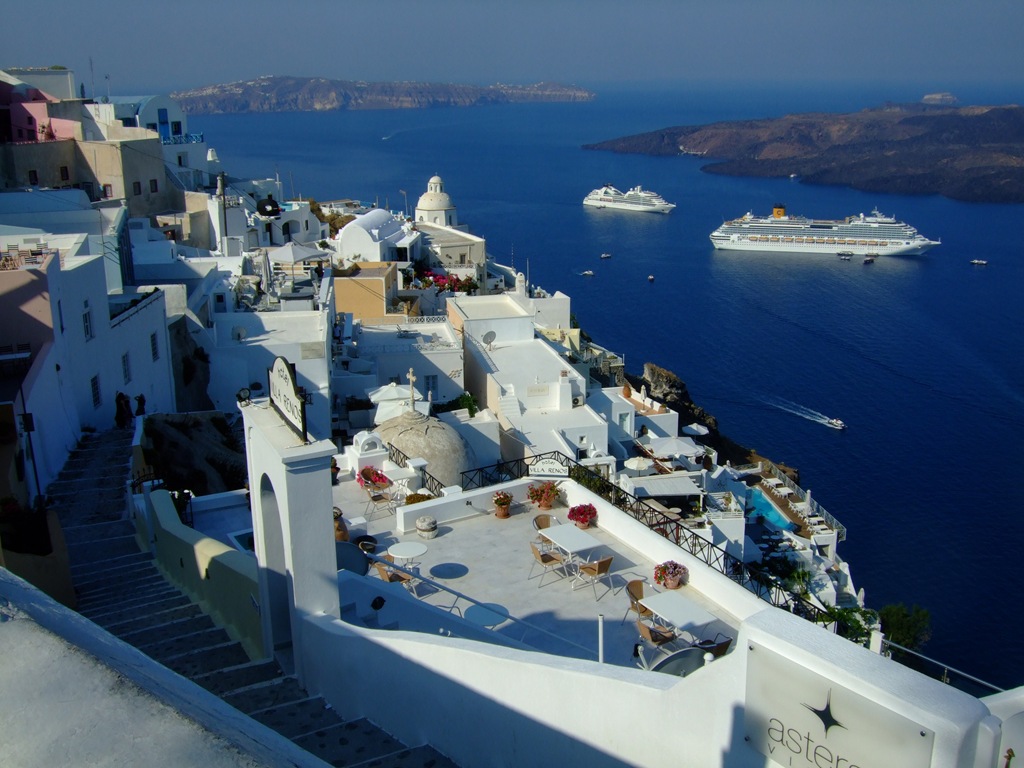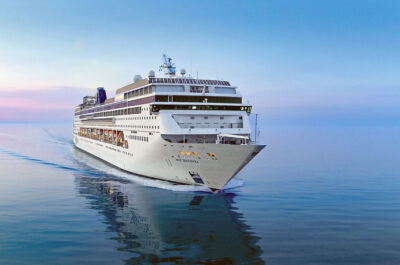The past year teaches us to remember the lesson not the disappointment. It must be a reset year for a “new tourism”. Let’s see the opportunity for change.
It has truly been so hurtful to see how tourism is devastated by the COVID-19 pandemic. The emerging situation of pandemic due to COVID-19 has not only influenced the daily life but also the society and travel activities around the world; no move no tourists. Data from the UN World Tourism Organization (UNWTO) demonstrated that 100 to 120 million direct tourism jobs are at risk. Also, the UN Conference on Trade and Development (UNCTAD) forecasts a loss of 1.5 to 2.8 per cent of global GDP. In the first five months of this year, international tourist arrivals have fallen by more than half and around $320 billion in tourism exports were lost, according to the top UN official. Additionally, in 2020 Greek tourism “revenues estimated below 20%, between 3-3.5 billion. The 15 billion euro that were missing from this year's travel receipts from abroad correspond to a percentage that is close to the level of 7.5% of GDP. Alas, only nine million passengers were handled at all airports in Greece in the period January – July 2020, showing a decrease of 74.3% compared to the corresponding period of 2019 when 34.7 million passengers were handled, according to the statistics of the Policy Service Aviation (kathimerini.gr)
Pandemics are clearly an important issue for society and tourism. Even if many of their potential threats and the actions needed to manage them have either been ignored or forgotten by the public, industry and politicians in general. Pandemics have long exerted vital selective forces not only on politics, communities and the economy (Wolfe et al., 2007) but also on the recovery of tourism. Tourism could be deeply different in a post-COVID-19 era. Whilst the pandemic will rearrange taken-for-granted determinants of tourism as we know it, a vital shift expects to arise in tourists' psyche: The pandemic will eventually fade and travel barriers will be lifted, yet some tourists' psyches will likely go for a new symmetry.
Notwithstanding it may be double-edged sword, pandemics can be an opportunity to reconsider the nature of tourism. This pandemic urges us to consider that the time is right to join forces by building bridges between the social and natural sciences. The impact of the Coronavirus pandemic on tourists' psyche will be obvious. Tourists will now search for other types of tourism; the ones that will reinforce their psychology, restore their safety & security and support and enhance their physical condition, etc. The Coronavirus pandemic revived people's existential anxieties by reminding them of their physical and economic vulnerability. It is during these times that our deep-rooted evolutionary protection mechanisms are activated. The focus on tourism shouldn’t be “business-as-usual” but “reinvent tourism”. We desperately need an evolutionary approach in the tourism discipline. Focus could be given on more local and sustainable forms of tourism, without substantial institutional and governmental interventions, which are currently overwhelmed with saving lives and creating conditions to restart domestic economies and education systems. Transformation should state from within. But utilizing different forms of tourism requires excellent organization, design and above all will. So the question is “We are not aware of the know-how or we simply do not want to?”
Nowadays, more than ever destinations and tourism businesses need
1. Help to be ready to provide tourism services to meet demand when the recovery comes.
2. To react and adapt promptly.
Everyone is talking about the new normal. Well, let’s create it! Crisis has been a call to action to governments and has highlighted the importance of new forms of tourism approaches to support recovery. While the current crisis represents a real threat to the tourist economy, it is at the same time the perfect opportunity for widespread reflection on the problems. Initially that may mean that we must reinforce and possibly reinvent other types of tourism.
The neglected Domestic Tourism in Greece has restarted and is helping to mitigate the impact on jobs and businesses in some destinations. Promotion of domestic tourism should be a priority. Domestic tourism is expected to benefit, as people prefer to stay local and visit destinations within their own country. Domestic tourists are often more price-sensitive and tend to have lower spending patterns. Our first aim should be to “Think globally and act locally“. Evidently the only viable tourism in Greece during summer season 2020 was domestic tourism, even in time of this pandemic.
Further on, Medical Tourism including dental tourism, cosmetic services and therapeutic dermatology; results in a competitive advantage over other destinations. In Greece, Asklepieia Health cluster has started an initiative by creating synergies and collaborations in order to promote such kind of tourism. Research shows that hotels with important wellness services have had +43% more turnover per available room as well as +20% higher daily average price (2020 Resources LEISURE Assets Global Report HotStats). In Greece, we are able to combine different forms of tourism. Unfortunately, there is lack of planning and design. We haven’t learned to hear the pulse of the market. We have been following the same tourist policy for years now. Greece is one of the greatest brands, which has never been properly “branded.” Noticeably Dave McCaughan, a marketing brand strategist has used artificial intelligence and has put keywords such as wellness, etc in search engines in order to locate our position. Guess what? Greece was
missing! The Global Wellness Institution has shown in 2017 the top 20 Wellness Tourism Destination Markets and the Leading Growth Markets for Wellness Tourism where Greece of course once more was absent. Greece has the potentials if we fully understand that old ways won’t open new doors.
The Αssociation of Greek Tourist Enterprises (SETE) conducted research in what contributes most to the development of Greece’s image abroad. The results were interesting indicating that, cultural monuments, reek products and wine accounted 63%. Except the average of 300 sunny days annually, the Greek tourism product is a blend “of natural, cultural and heritage attractions extended throughout the country”. Yet, “[l]ack of strategic and operational management know-how generates inconsistency in the creation and delivery of tourism products” (Tourism in Greece: Strategic Analysis and Challenges, Dimitrios Buhalis). At the moment as of a surprise there is at last a Sustainable Tourism Development Team that started to design and create opportunities for Gastronomic and Cultural Tourism. More than ever now, we need a gastronomic map that will show what each region has to offer and of course a central strategy such as the Greek cuisine brand (which must have recognition abroad as well).
It appears to be a real chance to reflect on the tourism of tomorrow without ‘recipes of yesterday’ but to actually change route. Consequently, it becomes obvious that tourism must reinvent itself by favoring softer, more ecological and human forms. "Ecotourism is catering for tourists wishing to experience the natural environment without damaging it or disturbing its habitats” (Wikipedia). Obviously, Greece whether we like or not the last 10 years (at least) was favorable to mass tourism. As a result, mass tourism had various socioeconomic, ecological, and cultural consequences. More than ever now we can exploit this pause in mass tourism to generate a Responsible tourism. How? By being responsible whatsoever and by integrating the principles of sustainable development into the process of decision-making and day-to-day activities. In that context, niche tourism (i.e. cycle-tourism) could revitalize the touristic product and overcome seasonality, which is the basic problem of mass tourism in Greece. By “[e]xploiting such an alternative can contribute not only to protecting the natural sources and people’s health but also revitalize local economies (European Cyclists’ Federation, Feb 2020).
Think about it, the tourism of tomorrow deserves a more qualitative approach that does not focus exclusively on increasing the number of tourists visiting an area, whether national, regional or local. It must better understand the uniqueness of each area, to give extra priority to the environment and culture and also reconsider the visitors whether they are external or local by placing always the inhabitants at the heart of the system. The aim should be to balance the attractiveness along with the sustainability of the territories. Apparently, without sustainability there can be no development that can benefit all stakeholders, end of story!
Tourism and crisis are two conflicting notions. I dare to say it is a challenge that there can be a possible positive side of a crisis in the case of a tourist destination. Indeed, in observing the efforts made to re-establish the tourism sector in a context of crisis, we realize that the problems to be solved go beyond the consequences of the crisis itself and extend to old existing problems even before the crisis. When a tourist destination is in a crisis, management becomes difficult. Undeniably, the bet in this case is to be flexible and ready to take action, a little test I presume. Think of Physics: B=P*v*g. The formula shows that the buoyancy is greater as the body sinks. Could Tourism behave like a body sinking? The more tourism is stormed by different-harsh conditions and external threats the greater could be the opportunity for evolution, growth and innovation. Rebuilding tourism must be in our priorities. There is a vital need to diversify and strengthen the pliability of the tourism economy, to get ready for future shocks, to address old structural weaknesses and to encourage new forms of tourism that will be essential to shift to stronger and more sustainable models of tourism development. However, we need to rethink and reshape tourism in that way that it can be flexible. Flexible policy solutions are required to enable the tourism economy to live alongside the virus (or any other upcoming difficulty) in the short to medium term, it is significant to look beyond this and take steps to learn from the crisis, which has revealed gaps in government and industry preparedness and response capability. Harmonized action across governments at all levels and the private sector is essential as well. Any crisis can be an opportunity to rethink tourism and certainly anything put in place at the moment will form the tourism of tomorrow.
Greece must ‘revolutionize’ its image, by focusing in new forms of tourism. Sadly, we have to note that the destination suffers from the absence of a clear, innovative and common strategy in tourism marketing. Pandemic, of course, has worsened further the situation with the destabilizing character of the crisis the country is going through. However, this crisis does not necessarily represent the end of the tourism but on the contrary an opportunity to make a deep diagnosis of the situation and move in the right direction. The new tourism marketing should therefore revolve around the promotion of a regional marketing, highlighting the particularities of the local population inspired by innovation tactics. The actual treasure exists in the authenticity of regional heritage that only local bodies would know how to offer. This is the “reformist path” proposed by Edgard Morin in his book La Voie in which he writes: “To develop the paths that would meet in the path, we must globalize and de-globalize, grow and decrease, develop and decline, conserve and transform”. For that reason it is vital to regionalize the tourist product and its communication, by substantially involving local ‘players’. In this way target will be better identified along with their own-unique tourism proposal. In addition, it is significant to note that such a measure requires continuous coordination of decentralized tourism promotion. The idea is to encourage a platform of communication engaging all tourism stakeholders with a view to recognize local wealth; with a national communication scheme.
On the other hand, we must comprehend that the difficulty in developing the tourism sector is not only a consequence of the revolution and successive disturbances only. In reality, the “new” crisis has called into question the very foundations of the sector. So it seems irrational and humorous, allow me to say, to talk about new forms of tourism and innovation while even basic things are nonexistent such as proper infrastructure in all levels. The Greek infrastructure is incompetent of “supporting the tourism superstructure growth of the last decades, and thus, telecommunications, transportation, police and health services, water supply, and sewage systems are under extreme pressure in the summer peak months to satisfy the demand density (Konsolas & Zacharatos, 1993: 63 and EIU, 1990: 61). As a matter of fact in Crete (and in plenty of other islands and regions) in many busy and known tourist resorts there are still, yes! In the year of 2020, rural roads with grave and no proper lighting. Furthermore, as Greece ironically is trying to promote the country as an accessible travel destination, accessibility for disabled or elderly people in famous beaches or ancients sights and monuments is inadequate. The large deficit in accessibility and infrastructure for people with disabilities in the archaeological sites and monuments of our country is apparent. Mr. Konsolas (member of the Parliament of the Dodecanese) points out that in two-thirds of the archeological sites there are no accessibility infrastructures for people with disabilities. Even in those where the necessary works are done; there are no infrastructures for guiding people with vision or hearing problems. We realize that the problems we are trying to solve go beyond the consequences of the crisis itself and extend to old existing problems even before the crisis.
The past year teaches us to remember the lesson not the disappointment. It must be a reset year for a “new tourism”. Let’s see the opportunity for change. After tourism has taken advantage of the advances of the “supposed” modernity and allowed the triumph of a utopia; the world's largest industry, tourism now symbolizes the dysfunctions of our world. Tourism sector could not remain indifferent to the challenge of our times. After this global pandemic everyone will be receptive to a fresh, enhanced, brand new normal. The challenge ahead is immense in terms of the complexity and uncertainty of the of tomorrow’s world. But any crisis is stimulating and it is time to reshape people's minds and to be creative in the quest for new routes. After all, “Progress is impossible without change, and those who cannot change their minds cannot change anything” George Bernard Shaw.
Philia Tounta MBA, Ba, Di, is General Manager at Apokoros Club Hotel Craft Deco & Activities - Apokoros Villas. Also, Customer Service Manager Thamiris Hotel-Studios-Villa, Travel & Hospitality Consultant-Hotelice, Tourism Ambassador HTS and a freelance writer (ehotelier.com, flashnews.gr, hotelexecutive.com, etravelnews.gr, etc) - Rapporteur.



























































































































































































